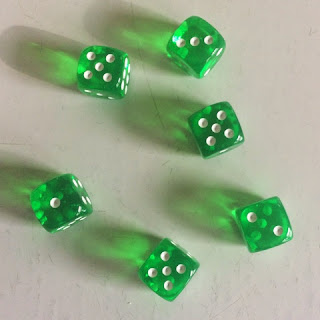What Are The Odds? Teaching With Farkle

At our school's staff Christmas party we played the game Farkle. It was a fun ice breaker that brought out the competitive nature of some teachers. In fact, every family received their own game to take home.
Since this is CS Ed week, that got me thinking about how this simple game could teach basic math skills. The basic premise of the game is to accumulate points by rolling specific numbers or combinations.
Players may roll until they "farkle" which is failing to roll a 1 or 5. That leads easily to a question of odds. What are my chances to farkle given the number of dice rolling?
I suggest letting students play the game for a few minutes to understand the basic rules and game play structure. Then pose the big question. Depending on students math abilities, this part may need more guidance, or they could look the information up online. What we learn is that it's a fairly safe risk (or low probability) a player will farkle as long as they roll three or more dice. Two dice will not farkle a majority of the time and one die is almost asking to loose points.
That was the math part, now comes the computer science aspect. Mathematical odds are all well and good but do they help us win the game? Have three people play the game, each with an established cutoff point. For example, one player never rolls less than three dice, another less than two and the third player always rolls one die. A fourth student then tracks the results. The goal of tracking is to determine which strategy is better in the long run. Students should determine the kind of data needed, collect it, then analyze the results. Did the experiment confirm their hypothesis?
Of course, very few of us play games with an unalterable game plan. Which leads to the third aspect: game theory. After reducing the game to its mathematical probabilities, it can seem rather boring with all the fun sucked out of it. So in this final stage, students become aware of how others impact their decision to role or not. Every choice is a risk versus rewards decision. That's where players get their thrills and where opponents try to sway others off their game plan.
For Christian schools, there are some major themes here. One question is if events happen by chance or on purpose? Another topic could be the role of personal choice: when should we step out from the "safe plan" and take on larger risk? This could lead into the Holy Spirit's role and God's will. And of course business teachers could jump in with financial principles and the wisdom we need when making risk versus rewards decisions.
But maybe the easiest (and often overlooked) application is dealing with peer pressure, the social aspect of gaming. Using Farkle as a fun context, it can easily teach digital and social skills. Who would have thought that so much could be taught from six little dice!
.jpg)




Comments
Post a Comment